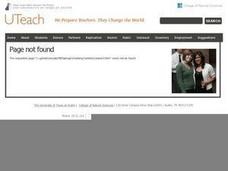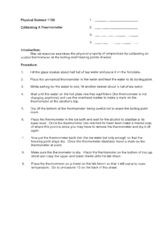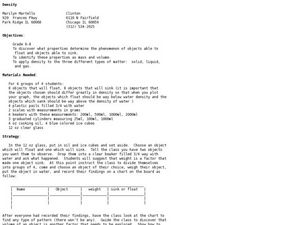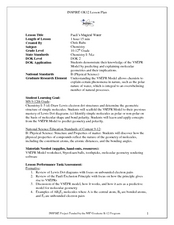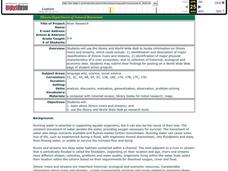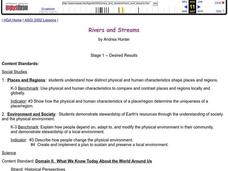Curated OER
Underwater Picture of the Hudson River Estuary
Young scholars identify important aspects of water quality such as slainity and turbidity. They test two of the water quality parameters and determine the quality of the water. In addition, they construct two sets of graphs based on data...
Curated OER
Is Dilution the Solution to Pollution?
Students explore the different types of pollution. they conduct experiments using dye mixed with tap water to measure the levels of dilution. They discuss at what point the dye (pollution) would be diluted enough to be safe to drink.
Curated OER
Matter and Change
In this matter and change worksheet, students answer 24 questions on topics such as elements, compounds, mixtures and chemical reactions. Students answer questions about the properties of matter such as their physical state and shape. In...
Curated OER
Matter
Third graders are introduced to the topic of matter. As a class, they brainstorm what they already know about matter and its properties. After completing a worksheet, they participate in an experiment in which they observe matter in...
Curated OER
Calibrating a Thermometer
Students calibrate an alcohol thermometer using the boiling and freezing point of water. In this physical science instructional activity, students explain what happens to boiling point of water as altitude increases. They calculate their...
Curated OER
The"Dirt" on Soil
Young scholars examine the three different types of soil and their physical properties. In this soil lesson plan students design and implement a model of a water treatment plant.
Curated OER
Density: Float or Sink
Students discover density. In this density lesson, students discover the properties of objects that allow them to float or sink in water.
Curated OER
Identifying Acids and Bases
Sixth graders observe the physical and chemical change that can occur in an acid and a base. In this acids and bases lesson plan, 6th graders use cabbage juice to identify, compare, and contrast acids and bases.
Curated OER
Introduce Solids
Middle schoolers identify and interpret a variety of solid materials - cloth, wood, metal, plastic, paper, and rubber. After a period of free exploration, they then describe the properties of the objects and develop vocabulary in order...
Curated OER
Science Lesson Plans
Students conduct a variety of exploration activities on various science topics. In this science instructional activity outline, students design a cell encapsulation to hold a specific type of medicine. They give examples of physical and...
Curated OER
What Can We Do To Change These Materials
First graders perform experiments to investigate property changes that occur in materials or matter. In the science lab, they use heat to explore changes in rice, sand, gelatin, baking soda and more. Learners observe and record the...
Curated OER
Let's Take a Rock Apart
Students take a crushed rock and sort the remains of the rock minerals into different categories based on the different properties. In this sorting lesson plan, students learn what makes up a rock and how to sort something into categories.
Curated OER
The Solar System: Why do we Explore?
Third graders act as scientists. In this property discovery lesson, 3rd graders explore the substance "Oobleck" (cornstarch, water, food coloring). They work in groups to investigate the substance and make observations as a scientist...
Curated OER
Quadrate Lab
Young scholars investigate tree stems and conduct an experiment on how non living factors affect living factors. In this tree stems lesson plan, students observe and record physical characteristics, and make predictions on what factors...
Curated OER
Rock Cycle SIOP Unit
Students collect rocks, identify them, classify them, investigate their properties, and more. In this rocks lesson plan, students also experiment with soil and erosion and weather.
Curated OER
Pauli's Magical Water
Students predict the shape of molecules using VSEPR theory. In this chemistry lesson, students differentiate a polar and nonpolar molecule. They discuss why water's polarity is very important.
Curated OER
Fizzy Pop
Fifth graders compare and identify variables that affect the rate of a chemical change using Alka-Seltzer, water, ice, and hot water. They time how long each variable takes to pop the canister into the air, and record the results on a...
Curated OER
Solids, Liquids and Gases - Part 2
Students experiment with balloons, soda water and raisins to find out about the states of matter. In this solids, liquids and gases lesson, students complete a group activity with balloons to recognize the state of matter in it....
Curated OER
Heat and Matter
Students explore liquids and solids by conducting in class experiments. In this matter instructional activity, students define the properties of matter and how heat can change those properties. Students experiment with heating objects...
Curated OER
The Components of Light
Students are given a mnemonic device to review the light spectrum as it relates to the different components of refracted light. In this components of light lesson, students read Light Magic and review the properties of light. Students...
Curated OER
Sound
Fifth graders explore and examine the basic properties of sound. In pairs, they speak through a balloon and listen to the sound vibrations, and listen to a ticking clock or watch through a variety of materials and identify the...
Curated OER
The Geography - Writing Connection
Students examine and describe the four physical systems of the Earth. Using two of the systems, they practice their writing skills and use vocabulary associated with the different types of landforms. They predict the types of shelters...
Curated OER
River Research
Students use the internet to research the streams and rivers found in Illinois. Using the information, they identify and describe the rivers and streams along with the physical characteristics of a river ecosystem. They share what they...
Curated OER
Rivers and Streams
Students research the rivers, streams and water bodies of Hawaii. They read a variety of books, play Bingo with water-related terms, create and maintain water-themed journals, view videos, conduct Internet research and participate in a...

